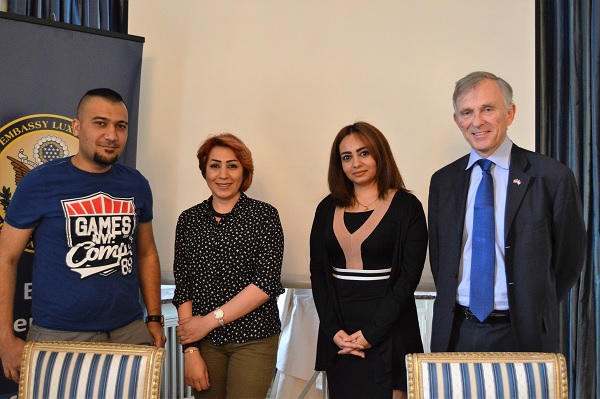
On Tuesday 3 May 2016, the U.S. Embassy in Luxembourg invited three Iraqi journalists living in the Grand Duchy to speak about their experiences in the media in recognition of World Press Freedom Day 2016.
New American Ambasssor to Luxembourg David McKean, who presented his credentials to HRH Grand Duke Henri in mid-April 2016, was present to introduce the speakers and highlight the important of a free press, which he stated depends "on brave journalists who tell us the stories we need to know, and who often speak for people who cannot speak for themselves."
The ambassador expressed his delight at finding himself in a country which enjoys freedom of expression and which was ranked 15th out of 180 countries for press freedom by Reporters without Borders. By contrast, this is not the case for many nations around the globe, with only 13% of the world's population able to enjoy a free press, meaning that "coverage of political news is robust and where the safety of journalists is guaranteed". Meanwhile, 41% has access to a partially free press, whilst 46% live in "Not Free" media environments.
Hind Alharbi and Ennas Al-Shareefi are no strangers to the concept of media suppression, having both fled Iraq after their positions as journalists in the country put their lives and those of their families in jeopardy.
According to Ennas Al-Shareefi, who left Iraq in 2015 and is still waiting for refugee status here in the Grand Duchy, her home country celebrates press freedom even though it does not have it. Ms. Al-Shareefi worked as a news reporter for several channels, stating "our job in Iraq is very difficult" - made all the more so by the fact that she is a woman.
As a Baghdad reporter speaking to affected people on the street, Hind Alharbi faced similar problems. The only woman working for the channel, shunning the hijab and opting to wear make up instead, her reporting on the broken lives of people on the ground made her a target for threats. Her car was shot at and two of her colleagues killed by militia. Fearing for her life and that of her family's after her mother was interrogated, she took what she described as the "really, really hard decision" to make the 22 day journey to Europe.
A video of the journey taken by Ms. Al-Shareefi aptly demonstrated why the decision was such a tough one. The desperation and danger is palpable; "a plastic boat in the middle of the sea with nothing but hope", in the words of Ms. Alharbi. These meagre means of travelling belie the actual cost of the journey, which for Ms. Al-Shareefi was around $10,000, whilst Ms. Alharbi's group of six people each spent €4,400 getting themselves to Europe. For people without these financial resources, leaving is therefore simply not an option.
But even having the means holds no guarantees of safely reaching the destination. Ms. Alharbi explained how the boatman told those onboard he would take them to Rhodes, instead bringing to an isolated mountain atop an island in the sea. Stranded under the burning Greek sun with no food, the group drew on a method that is being widely used by 21st century migrants: posting their location through GPS technology on smartphones. However, their detached location prevented them from being found this way and the group was instead forced to build a large fire to attract attention.
Smart phones have increasingly become a staple of a migrant's journey, as it provides access to social media which holds Facebook groups explaining how to find smugglers and other essential details needed for the trip. "Without social media we would be lost," simply stated Ms. Al-Shareefi, who explained how the medium is used for migrants to connect with and support each other, track friends and family and for those who have made it to Europe to pass on information on each step of the journey to those for whom the process is only just beginning. In this sense, Ms. Al-Shareefi claimed that tools such as Facebook replace traditional media as reliable source of information when freedom of the press is but superficially celebrated.
"The founding fathers of the United States believed that freedom and free access to information were inseparable," commented Ambassador McKean. "Thomas Jefferson, the third president of the United States and the author of the Declaration of Independence said, "Our freedom depends on a free press, and that cannot be limited without being lost." We still believe that."
Photos by Sarah Graham (Top L-R): Ali Sahib; Ennas Al-Shareefi; Hind Alhardi; Ambassador David McKean








